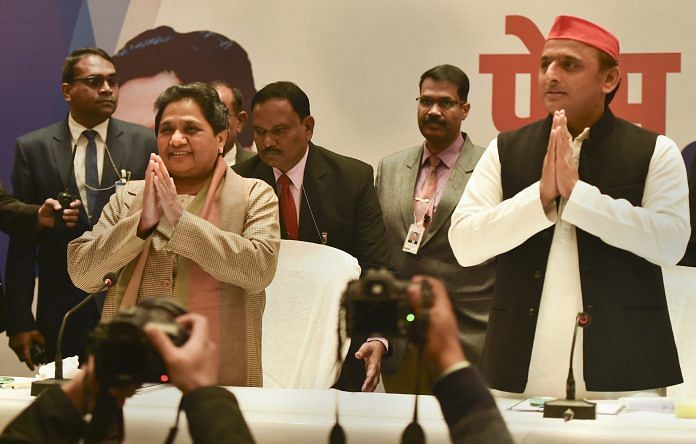But experts express doubts, say difficult to imagine SP, BSP alliance surviving for 3 more years.
Lucknow: With the declaration to join forces in the upcoming Lok Sabha polls came another announcement – the intent to carry the partnership further than 2019.
On Saturday when the Samajwadi Party (SP) and the Bahujan Samaj Party (BSP) formally announced their alliance, they also expressed their resolve to nurture their partnership and contest the UP assembly polls in 2022.
“This SP-BSP alliance is a permanent one. It will go on further and after the Lok Sabha elections when state assembly elections take place in Uttar Pradesh, it will carry on even then,” said BSP chief Mayawati, responding to a query on the fate of the alliance after 2019.
In 2017, while the BJP swept the assembly polls in UP by winning over 300 seats, the BSP and the SP incurred severe losses. In one of its worst performance since 1991, the BSP managed to win only 19 seats as opposed to 80 in 2012. A similar drubbing was received by the SP which managed to win just 47 seats.
Will the bonhomie continue?
Whether the two parties manage to sustain their coalition for three more years, considering their nearly 26-year-old rivalry, will be difficult to ascertain so soon, political experts say.
The percolation of bonhomie to the party’s grassroots, alleged unreliability of Mayawati and the volatility of such an alliance can be a death knell to their ambition for jointly contesting the 2022 UP assembly polls, they say.
“It is too early to say whether the alliance will be able to sustain itself till then. Take the example of 2017 assembly elections which had seen a Congress-SP alliance. Akhilesh and Rahul Gandhi used to travel in the same cars and campaign. Where do they stand now? Moreover, Mayawati has proven to be highly undependable. Look at what happened in Madhya Pradesh. Mayawati put Kamal Nath-led government on hold until cases against Dalits where withdrawn,” said K. Vikram Rao, a senior journalist who heads the Indian Federation of Working Journalists.
‘Clever Akhilesh tactic’
Meanwhile, political scientist and author A.K. Verma maintains that while the proposed extension of the alliance to 2022 does not come as a surprise, it was too soon to predict the alliance’s future for the next UP assembly polls.
“Akhilesh has already accepted Mayawati as a senior partner in the alliance and this progression of the alliance to 2022 is natural. Because of her success in social engineering seen in the past decades, Mayawati has gained more importance as a national leader. This, along with her nursing national ambitions, is something that Akhilesh has thought.
“By being non-committal on the question of the PM face and keeping everyone guessing, Akhilesh has used a clever tactic. He does not have much at stake as far as parliamentary elections are concerned except gain ground for his party at the grassroots level. By letting Mayawati dream of PMship, he has paved his way to being the contender for the CM in UP,” Verma said.
Verma further added that the outcome of the Lok Sabha polls needs to be taking into account. “These two parties seem to be looking at the alliance model of JD(U) and RJD in Bihar and that of Mulayam Singh Yadav and Kanshi Ram in the early 1990s. However, for the first time here, two subaltern parties have come together during parliamentary polls,” he says.
Expressing concerns similar to those raised by Rao, Verma feels that the transferability of votes from between the two parties will be crucial. “Taking a third alliance model into consideration – the Congress-SP one during 2017 assembly polls – one can see that votes were not transferred from the SP to the Congress,” he says.




Mayawati has realised first time how bad could be the rule of upper caste controlled parties like BJP and Congress for interest of larger masses of India. After all the ideology of SP and BSP is in sync both the parties talk of social justice and seeks representation of OBC, dalit and minorities in proportion to their share in total population. This alliance is not the allaince of two parties but alliances of the people which bound to last long. Both the leader will remain under pressure from people and their supporters and it is very unlikely that this alliance will break any time soon. This alliance is beneficial for both the parties and can give opportunities to expand in other states and emerge and alternative to BJP n Cong
Difficult to predict what the weather will be like in Awadh in May 2019, much less in March 2022. However, for such natural adversaries – like the TDP and the Congress in Andhra – to fuse seamlessly together for the long term underlines the costs and consequences of maximalist politics. India has seen majority governments before. In all likelihood, we may not have to wait thirty years to see the next one. However, neither history nor politics was transformed in May 2014. To be perfectly honest, nor were governance and growth. A certain Deng like Keep your head down and get on with the job would have worked so much better. The stoic calm of Sardar Patel, for example.